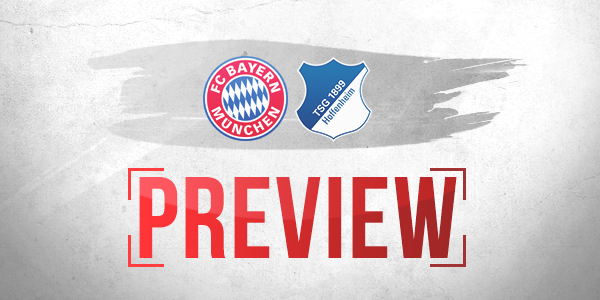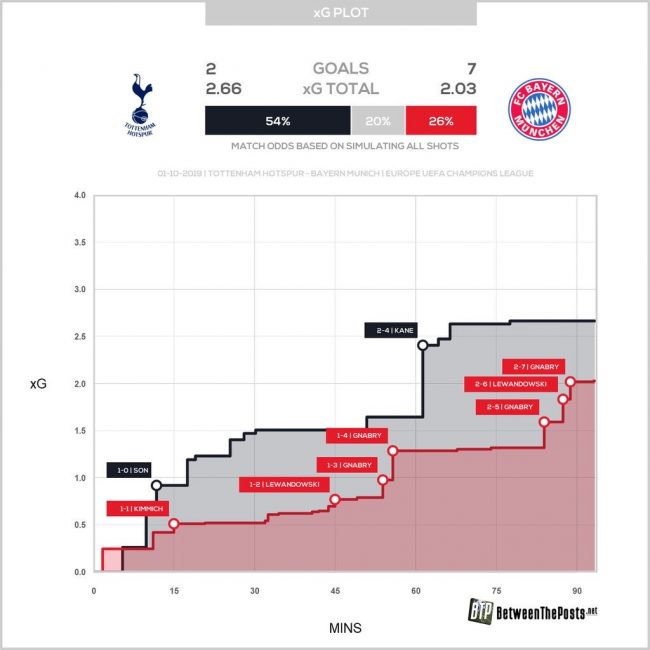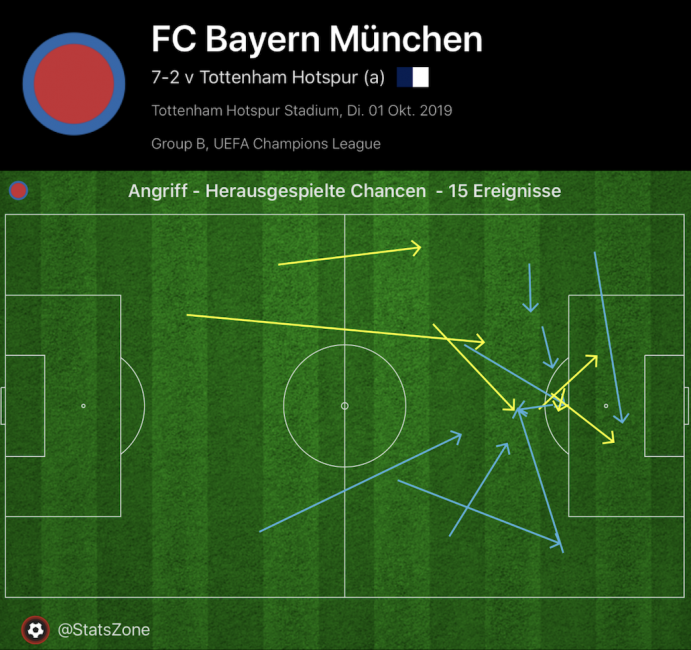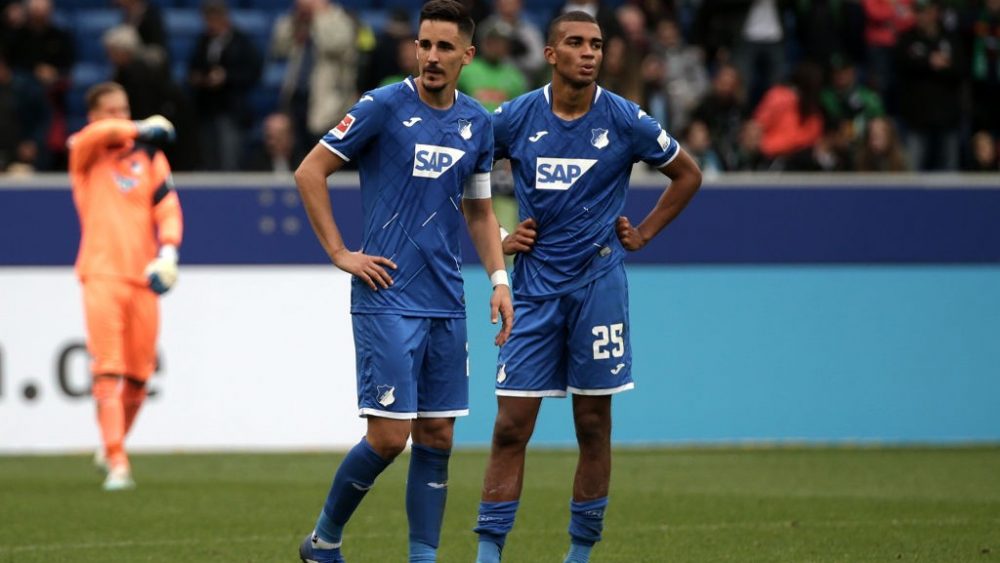Bundesliga MD 07 preview: Bayern against Hoffenheim
Bayern and Hoffenheim have met 22 times in competitive matches. A record of 15 wins, 50 goals, and only two defeats for Bayern speaks for itself. But many of the two teams’ contests have been very tightly fought. Although Bayern’s last two scorelines at home suggest two easy wins (3-1; 5-2), Bayern has traditionally been struggling against the team from Rhineland-Palatinate.
But this season, Hoffenheim is a team in transition. They only got five points from their first five Bundesliga matches. They only managed one win against a very mediocre Bremen with 3-2 goals. Otherwise, there were two rather resounding defeats against Freiburg (0-3) and Gladbach (0-3) and two draws against Leverkusen and Wolfsburg. A narrow 0-1 defeat against Frankfurt on matchday 01 and a win on penalties against Würzburg in the first round of the DFB-Pokal round out a complicated start to the season.
However, a start like this could not have come as a big surprise to many. With Joelinton, Kerem Demirbay, Nico Schulz, and Nadiem Amiri, Hoffenheim lost five key players that were crucial to their performances in the past before the season. They could only partly make up for this by the signings of Diadie Samassékou and returnee Sebastian Rudy. In Robert Skov and Ihlas Bebou, two more players arrived whose hefty price tags of €10m for the former and €8.5m for the latter served to raise expectations.

Hoffenheim: a mid-range club in truth?
On paper, it seemed certainly strange what Hoffenheim did in the summer. It was evident that their’s would become a very challenging campaign. The loss of key players is one reason. Another one is the departure of their long-time coach Julian Nagelsmann, who was the living personification of Hoffenheim’s success in recent years. Nagelsmann perpetually managed to get the most out of Hoffenheim. When he assumed the job as the youngest head coach in the history of the Bundesliga at 29 years of age in 2016, he saved a team whose relegation seemed a certainty from its fate. In the following years, Hoffenheim did not invest big sums of money in new players. It was due to their coach’s exceptional ability to improve his players that this was not necessary for the team to become as successful as it did.
He turned a mid-range team into a regular contender for the European places. He has thus raised the bar considerably for everyone coming after him. As a revenue surplus of €135.08m in the 2015/16 season alone testifies, Hoffenheim have established themselves as a launching pad for young and talented players over the last years. Selling young players as soon as they have made a name for themselves without substantial reinvestments is their modus operandi. That a transfer fee of €12m for Samassékou in the summer was the club’s all time record tells the whole story.
With a sum total of transfer expenses at €130.39m since the summer of 2015, Hoffenheim comes in at 9th place in the Bundesliga. The clubs around them are Mainz (€121.66m), Frankfurt (€121.27m) and Stuttgart (€133,92m). From seventh place up (Gladbach, €185.55m) the figures rapidly increase.
Schreuder: a student of Nagelsmann and ten Hag
When Hoffenheim is criticized for the considerable financial means they have available, it is often forgotten that they have been doing a very commendable job in light of how little money they invest in new players. They have signed 115 players since the summer of 2015 at an average transfer fee of €1.13m and sold 109 players at an average transfer fee of €2.43m. Not a bad return on an investment.
The question the club has to ask itself in its phase of transition is now: will we aim for more or are we happy with life as a perennial mid-table entity? Under Ralf Rangnick and especially Julian Nagelsmann, Hoffenheim was synonymous with innovation. The club wanted to innovate and improve constantly, on and off the pitch.
In Alfred Schreuder, Hoffenheim has got a coach now who at one point had been an assistant coach to Julian Nagelsmann at Hoffenheim and later part of the coaching staff of Erik ten Hag at Ajax. Hoffenheim’s decision to hire him now looks like a logical choice, given that Schreuder has had the opportunity to work with, and learn from, both of these coaches. He will have taken his inspiration from them and adopted much of their knowledge and philosophy, which will go a long way to significantly decrease his settling in period at Hoffenheim.
Where are the surprising moments?
And yet, Schreuder will have already recognized quite how big a pair of shoes he has to fill. Consistently securing an upper third table spot for a club like Hoffenheim every season is something that even his predecessor Julian Nagelsmann did not succeed in doing in his last year at the club.
Schreuder may have taken his inspiration from Nagelsmann, but he nonetheless intends to make slight changes to the foundation set by his mentor. He wants to put a greater emphasis on control in possession and slow down the pace of the match overall. This might be the ten Hag school at work. Yet, his team has been struggling to implement his ideas. Except for the game against Leverkusen, Hoffenheim has always had more possession than the opponent so far, but their game lacks a spark of creativity and an element of surprise.
Schreuder’s tinkering with his team’s formation also did not prove a remedy. He entered the season with the customary 3-4-2-1 the team was familiar with from the Nagelsmann days, but lately he has also tried a 3-5-2, a 4-2-3-1, and a 4-1-4-1. The results have been sobering but they highlight what lengths coaches will go to if other measures do not bring about a change.
Not much pace and threat
Despite their individual class in midfield, Hoffenheim does not manage to attain control of a match and create good chances at the same time nearly often enough. 12.5 shots put them in 12th position in the league. A sum total of 5.29 expected goals is the worst figure among all teams in the season up to this point. With just four goals, they also have scored the fewest goals together with Cologne this season. This is partly due to the fact that Hoffenheim does not use the half spaces as effective anymore as they did under Nagelsmann. Dennis Geiger has to play more offensively under Schreuder and cover a much larger area of the pitch with his actions. This leads to big gaps in midfield and a monotonous pace of play. Hoffenheim cannot speed up the game when needed and loses the ball too often compared to their number of shots on goal.
Schreuder and his new formed team have a long way to go yet. The slowed down pace was meant to reduce the vulnerability of being hit with a counterattack. Hoffenheim’s gegenpressing, however, does not yet quite go as planned due to poor positioning of their players. And this gives opposition like Frankfurt and Freiburg plenty of opportunities for counterattacks.
Hoffenheim seems to feel a little bit more comfortable against opponents who like to be active and participate in the game. The 3-2 win against Bremen, the goalless draw against Leverkusen, and the 1-1 draw against Wolfsburg serve to underscore this observation. Against Bayern, Hoffenheim will probably be the less active team too and focus on counterattacks.
Hoffenheim’s left flank: an opening for Bayern to exploit
Hoffenheim’s intensity in pressing seems to have subsided a little under Schreuder compared to previous years. He favours pressing in midfield and getting back into shape swiftly when his team’s attempts at pressing do not immediately win them the ball. In the game against Leverkusen, this resulted in long periods without the ball that saw Hoffenheim defending very deep with most their players in and around their own penalty area. That the game ended without Leverkusen scoring at least one goal was due to a combination of concentrated defending and sheer inability on the part of the opponent.
Despite evidence from the game against Leverkusen to the contrary, Hoffenheim is vulnerable when they fall back and passively wait for their opponent to act. The first goal they conceded against Gladbach came through their left flank, which has been their more vulnerable defensive side so far this season. The team was almost powerless to move back in a coordinated way, which always left them a crucial moment too late.
It will be important for Bayern to know that neither Konstantinos Stafylidis in the back four nor Robert Skov at left-back are able to plug the hole left by the departure of Nico Schulz to Dortmund. This gives Bayern the opportunity to attack Hoffenheim’s left side through overloading or cleverly switching the play to create space on their own right-hand side.
Looking back: clear winners against Tottenham?
The 2-7 away win should have been a great boost to Bayern’s confidence, but there is no reason for exuberance. The landslide scoreline is far away from being anything close to a fair representation of how the game went. During the first 30 minutes, Bayern showed glaring deficiencies in their build-up play. Without Thiago, the team was not able to play constructively through the centre and was permanently caught out by Tottenham’s pressing.

Only as Tottenham took a breather after half an hour of full tilt pressing and allowed Bayern to have more time and space on the ball, Bayern started to gain a modicum of control in the game. Yet, their two goals before half time did not result from periods of consistently applied pressure, but from two moments of individual class.
For the first time in quite a while, Kovač had gambled with his starting lineup – and lost. Tolisso and Kimmich did not harmonize and Couthino was not linked up properly as a result. Thiago was missing everywhere. Even though the Spaniard has committed his fair share of careless errors recently, the first half was testament to how key a player he is for Bayern’s game at the moment.
Is Tolisso becoming a problem?
Tolisso has not been really integrated into Bayern’s game so far this season, some brighter moments of his in some games notwithstanding. One reason could be that he is still recovering from an almost season long injury last year, but this cannot completely explain why he keeps being caught out of position with regularity. Tottenham, for example, had an easy time marking Kimmich and continuously attacking and putting pressure on Tolisso in order to elicit mistakes from him.
Perhaps Kovač should consider more generally if Tolisso is a serviceable holding midfielder at all. The Frenchman’s original strength is to play as an offensive number eight who can create threatening chances from behind the front line and is useful in gegenpressing. Playing in deeper positions, he is much more vulnerable and has deficits that hurt a team like Bayern at this level.
The coach explained his decision with tactical reasons. He regards Tolisso as a more offensive player than Thiago. Unfortunately, his decision almost became very costly for his team. Instead of Bayern’s usual 3-2 formation at the back, i.e. a two man defensive midfield in front of their back line (Pavard – Süle – Boateng / Kimmich – Thiago), their shape turned into a 3-1 or even 4-1 at the back when one of the two holding midfielders sat too deep. Tottenham’s 3-2 shape in attack suited this perfectly and allowed them almost complete control in midfield.
Developments take time
Still, the game also allowed for some positive observations. It was good to see in this match as well as in previous matches that Bayern generally have been trying to change their game. They delivered only 14 high crosses against Tottenham although they sometimes had difficulties moving the ball forward, which normally invites a cross from no man’s land.

This graphic shows that Bayern aims for greater variety in build-up play – even though a lot of shots are taken from areas of little threat. Philippe Coutinho ist one of the most – if not the most – important factor in this. He added a new dimension to Bayerns midfield game and links up well with Thiago and Kimmich. Although he was almost invisible on Tuesday night and is still only settling in at Bayern, he holds a lot of promise for Bayern’s game in the future.
It is worth taking a look at Kimmich’s role as a starter in midfield in this context. Bayern want to minimise the element of chance implied in an attacking game based on high crosses and establish a more structured offensive play. This has already made their attacks during this season more attractive than last year. But it is also a fundamental change that will still take time to take root. The game against Tottenham showed that there are remaining issues in coordination and linking up that need to be addressed. It is all the more important that a test like this has come at such an early stage of the season, despite the risk that the result might cover up the problems.
Hoffenheim will not prove quite as forceful in pressing as Tottenham. Another thing to watch is what changes Niko Kovač will make to his lineup ahead of the international break. A moderate rotation in three or four positions seems likely. It is important for him to do this not just for the sake of fitness, bit also to maintain a good team morale – almost as important as a win against Hoffenheim to stay at the top of the table.





